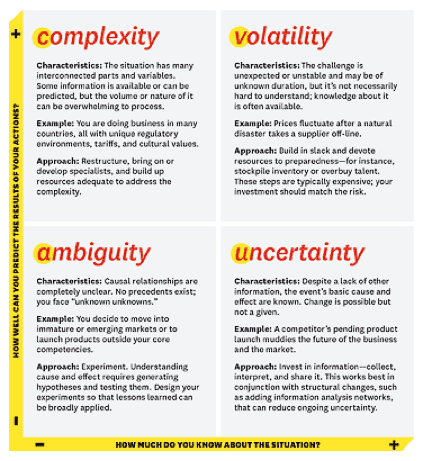A Solution for a growing company: VECA (Variable Employees Committed and Agile)
I had a “disruptive awakening” recently. I had just finished reading an article written by Wilma Slenders (PhD, PCC, CMC) of the ICF-Calgary Chapter, in which she discussed a conference she had attended entitled “Executive Coaching on the cUsp of Disruption: What’s up with the Mash-up?”. The conference was co-presented by David Peterson, Director of Google’s Center of Expertise on Leadership Development and Executive Coaching, and Whitney Johnson, author of “Disrupt Your Life: Putting the Power of Disruptive Innovation” and “Everyone Has an S-Curve: Driving Engagement by Developing Employees who Disrupt for a Living”.
Wilma writes that within the conference, Peterson and Johnson discussed the radical and disruptive change we are experiencing in society and business, trends in coaching, impacts of exponential growth, and how those factors impact and influence the future of coaching.
We live in a VUCA (Volatile, Uncertain, Complex, Ambiguous) world, where things that once were certain are no longer, and where our normal way of doing business, making products, marketing, and leading are all under siege. Johnson observed that in stable environments, we optimize performance around current needs, which typically leads to success. However, things are different in VUCA environments. In these situations, sustainable success requires under-optimizing current performance in favour of investing in robust strategies to increase flexibility and adaptability, supposedly with the goal of enhancing future performance. In some cases that means stepping back in order to grow, starting again, or in approaching situations with a beginner’s mindset.
Want to know more about VUCA?
Check out:
What VUCA Really Means for You
Nathan Bennet and G. James Lemoine

With so many things on a leader’s plate, how does one prepare their organization to focus on the day-to-day — and on future growth and investment — without sacrificing employee engagement and diminishing your profits?
The solution may lie in the concept of VECA (Variable Employees Committed and Agile).
Twelve years ago, I was Executive Assistant to the Executive Vice Chairman and CEO of one of the large banks and financial conglomerates in the Philippines. We looked at the possibility of increasing variable compensation; reducing the portion of fixed pay and increasing the portion of variable pay. This concept would provide a company an expense stream that would follow and be correlated to its income stream. In a good year, more would be spent on employee compensation as the variable portion would be tied to good performance. Conversely in a tough year, compensation costs could be reduced. The trouble was that you want to be able to retain your employees, and that model ran contrary to the cyclical nature of variable compensation. So the idea proved difficult to implement and it remained an idea.
But in light of VUCA, I started to wonder whether the time for variable employees has arrived. The distinction would come in using a different and innovative way of managing these employees — and finding a niche — where this might work.
As an Executive Coach, I see corporate clients wanting to build a culture of coaching in their companies. The challenges with implementing that on a large scale are many.
Some employees already feel stretched in just managing their year’s targets and customer requirements. In a VUCA environment, these would likely prove more complex to handle. In other companies, even though coaching is something the organization wants, the reality is that not every leader is inclined to coach. So even if training is provided, it may not always align with the leader’s passions or desired areas of improvement.
The happy-medium might be to use coaching techniques for everyday management but to bring in a coach that is VECA (Variable Employee Committed and Agile) for long-term development goals, be they leader development, succession planning, or strategic HR initiatives.
Important/Not Urgent is a category used to bucket those items that are important to long-term growth and future success, but since they are not urgent, are usually moved down the list of priorities. As a result, that which drives future growth gets forgotten.
Bringing in a separate, distinct VECA (Variable Employee Committed and Agile) who will fill this long-term strategic role may be the key.
The success to this strategy lies in the following:
- Find a Variable Employee who is Committed. Someone who shares your values and vision, and who supports where you want to go. Wait to find these resources.
- Provide the Variable Employee a performance incentive just like a regular employee. That ensures you will get the best quality work from them as they have an upside and they win when you win.
- Allow them to seek opportunities elsewhere in a non- competing market since you don’t require their expertise full-time.
- Consider them an “employee” not a “supplier” and flex some non-monetary benefits such as allowing a longer period to renew a contract (12 weeks) as opposed to the regular 2 – 4 week notice given to regular employees. This gives a variable employee the ability to stabilize their total work and compensation without relying solely on you, adding to their Agility. Apply an innovative view of managing this relationship by benchmarking with real estate customers who sign-up for a long-term lease (say 5 years) with an annual renewal but a termination clause that requires 60 – 90 days notice. This enables the employee to have a long-term view while allowing the company the flexibility to end a contract if, for example, the project does not prove successful.
Coaching is a business aspect where this approach can work right away. Other areas you can consider in your organization include IT resources, business development, and pre-sales functions.
It is time to rethink human resource management in the time of VUCA. Maybe the answer lies in starting to explore VECA – Variable Employees Committed and Agile.